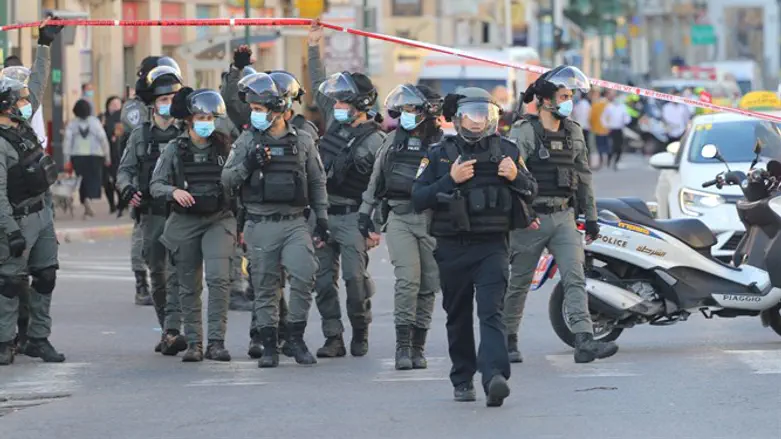
A special survey conducted by Kikar Hashabat in collaboration with the Kayama Institute shows that the solid majority of the Haredi public does not trust the Israel Police. In a sectoral internal division, the prevailing distrust of the Hassidic sector is the highest. The relatively dramatic figure, which may be cause for concern for the police, stems from the fact that a policeman is perceived by the average Haredi as a threat rather than a positive figure, along with the fact that the majority of the public thinks that the police are abusing their powers.
These are the conclusions of the comprehensive survey, in which 2,373 respondents participated:
Distrust of the police
The data show a clear statement of distrust towards the police, on the part of the respondents to the survey. 66.7% of them indicated that they have no trust in the police at all, 22.8% answered that they have little trust in the police only 3.5% reported that they have a lot of trust in the police and 5.1% that they have a lot of trust in it.
In the segmentation of the answers according to individual sects, it can be seen that in the Hasidic public the distrust of the police is higher than in the other circles. The percentage of Hasidic respondents who have no trust at all is 73%, compared to 66.4% in the Litai and 63.3% in the Sepharadic public.
The vast majority of survey respondents are afraid of meeting with a police officer. 29.8% are afraid of receiving a ticket a police officer, and 45.7% are afraid of actual harassment. It can be said, according to the data from this survey, that a policeman is perceived by the majority in the Haredi sector more as a threat than as a positive figure. It was found that only 4% of the respondents indicate that a meeting with a police officer gives them a sense of security.
It is also clear from the answers to this question that the attitude towards a meeting with a policeman in the Hassidic circles is the most negative. A high percentage of them are afraid of meeting with a police officer, and in particular of harassment by a police officer, while among the Sepharadic population such respondents are at the lowest rate and among Litai there is a relatively high fear of harassment.
It is important to note that even in the Sepharadic sector, the percentage of respondents who fear harassment is still high: approaching 40%.
One can see disagreements regarding police deterrence: 28% of survey respondents think police presence is daunting because people do not want to get fined, 32.7% think police presence actually works a reverse effect which can lead to disorderly conduct.
Looking at these two views within each sector, it can be seen that the gap between them regarding the influence of the police presence - deterrent or provocative - is found mainly in the Hassidic sector. The ratio between those who answered that a police presence creates a provocative response and those who think it is a deterrent is alarming: 42.9% of respondents from the Hasidic sector believe that the police presence creates a provocative effect, compared to 25.6% who think that the police presence is a deterrent
The survey highlights the sense of persecution that the Haredi sector feels from the police, especially during the COVID-19 crisis: Most respondents to the survey - 60.7% - believe that the police enforce compliance with guidelines in the Haredi sector more than in any other sector. In contrast, a minority - 17% - of the survey respondents think that there was less enforcement in the Haredi public compared to other sectors.
Looking at those who answered that the Haredi community were more carefully scrutinized than others, it can be seen that the distribution is almost equally divided among all parts of the Haredi community.
Most of the respondents stated that in their opinion the police abused the various powers given to them. 75.4% of respondents to the survey indicated that the police had abused their power to use force to maintain public order. 74.3% also referred to the authority to detain, 68.6% think so about the authority to interrogate witnesses and suspects, 56% think so about physical search and search of buildings and vehicles, 44.3% about the authority to carry and use weapons by police officers.
In contrast, in the fight against terrorism, only 30.3% indicated that they believe the police have abused their authority.
Two main conclusions emerge: One - the vast majority of the public - 90.7% of the survey respondents - sees a need to improve relations between the police and the Haredi sector. Only 9.3% of respondents in the survey indicated that there is no need to improve the relationship.
The second conclusion: the absolute majority of the respondents (60.9%) see the way to improve the police's treatment of the Haredi community in appropriate training for police officers in order to get to know the Haredi population.
Incorporating the Haredi into the police force and appointing Haredi police officers also seem like possible solutions, but this is a relatively marginal rate (only 16.9%) who see this option as a solution.
In addition, it is evident that there is also intra-community criticism, albeit at a low percentage. 12.7% of the respondents to the survey indicate that in their opinion, what will improve the police's attitude toward the Haredi will be improved law enforcement among the Haredi population.